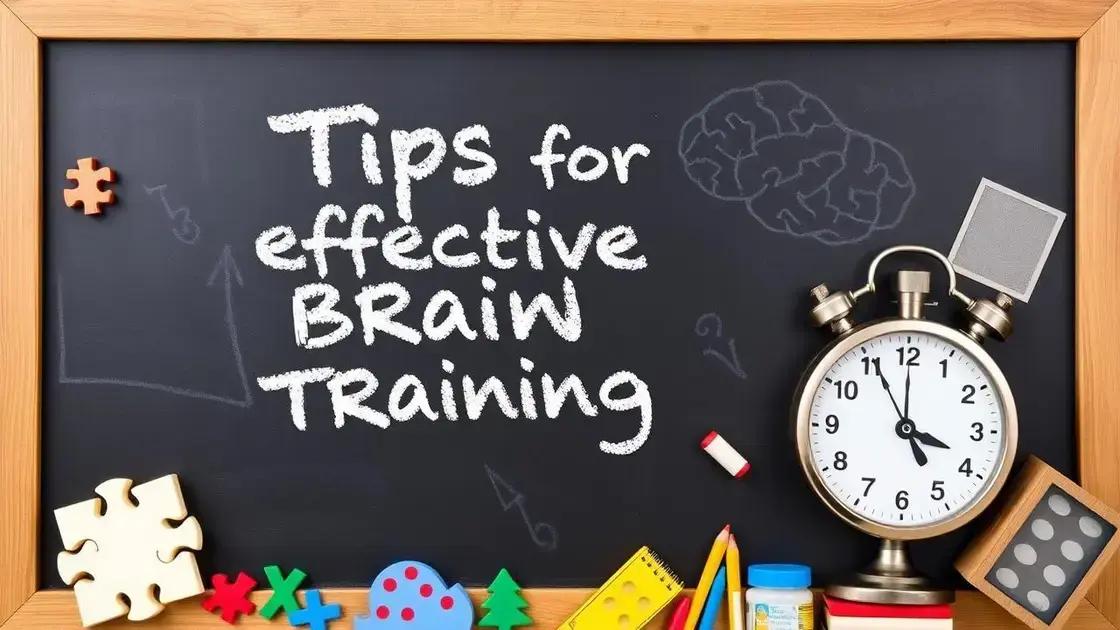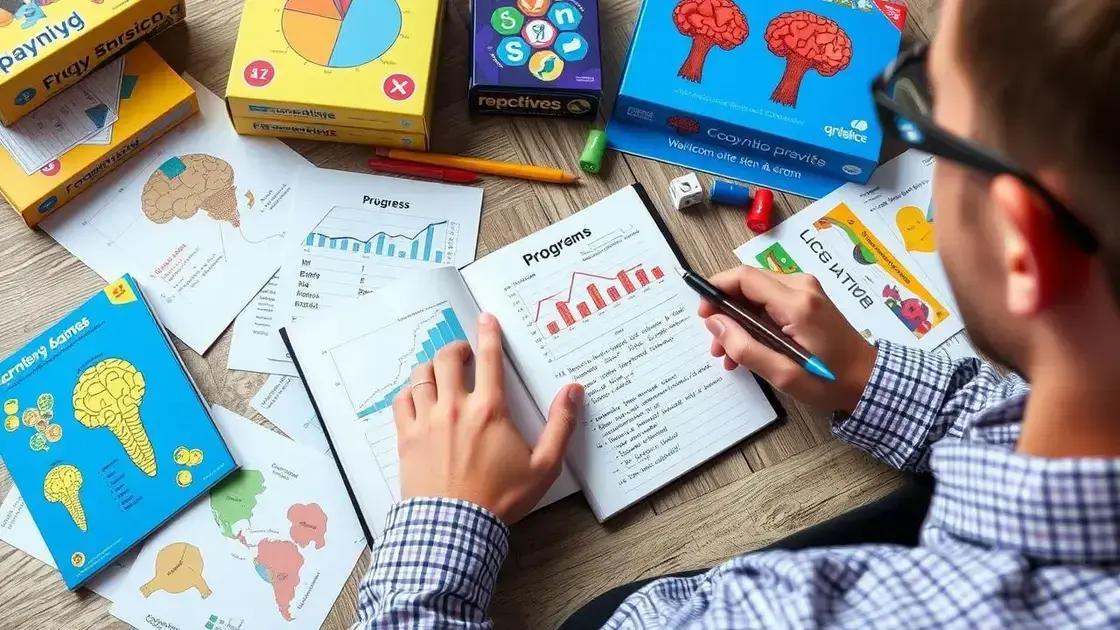Daily brain exercises are essential for staying mentally sharp and enhancing cognitive abilities. Engaging in activities like puzzles, memory games, reading, and creative writing can improve memory and problem-solving skills. Consistency, variety, and measuring progress through self-assessments and journaling are crucial for effective brain training.
Staying mentally sharp is crucial for maintaining cognitive health as we age. Engaging in daily brain exercises not only enhances our memory but also boosts overall brain function. This post will guide you through effective strategies to incorporate brain workouts into your routine. We’ll discuss exercises you can implement, tips to make the training effective, and how to track your mental improvement.
The Importance of Mental Sharpness

The importance of mental sharpness cannot be overstated. Keeping your mind active and engaged helps you maintain cognitive function as you age. It is essential for decision making, problem-solving, and emotional well-being. When your brain is sharp, you can think more clearly and respond quicker.
Being mentally sharp allows you to learn new skills and adapt to changing environments. This is helpful in both personal life and professional settings. With strong cognitive abilities, you can navigate challenges better and seize opportunities.
Benefits of Staying Mentally Sharp
There are numerous benefits associated with maintaining mental sharpness. First, enhanced memory helps you recall valuable information with ease. Second, sharp cognitive skills boost your creativity, allowing for innovative solutions. Finally, staying sharp contributes to a positive mood, helping to reduce anxiety and stress.
How Aging Affects Mental Sharpness
As we age, it is common for cognitive abilities to decline. However, staying mentally active can combat these effects. Engaging in activities that challenge your brain can help maintain and even improve mental sharpness. This is where daily brain exercises come into play.
Remember that mental sharpness involves not just memory, but also attention, reasoning, and social cognition. Regularly challenging these skills can create lasting benefits.
Daily Brain Exercises to Try

Engaging in daily brain exercises can significantly boost your mental sharpness. Below are several fun and effective exercises to try every day.
Puzzles and Games
Doing puzzles like crosswords, Sudoku, and jigsaw puzzles can sharpen your problem-solving skills. These activities require focus and help improve your pattern recognition.
Memory Games
Memory games challenge your recall abilities. You can use cards or apps designed for memory training. Try to remember the locations of specific cards to strengthen your memory.
Reading and Comprehension
Reading books, articles, or even listening to audiobooks can enhance your comprehension skills. After reading, summarize what you learned in your own words to reinforce the information.
Creative Writing
Spend time writing daily. Journaling, poetry, or short stories help stimulate your imagination and improve your language skills. Be creative and let your thoughts flow freely.
Physical Activities
Combining physical exercises with brain workouts is beneficial. Try dancing, yoga, or even tai chi to engage your mind and body simultaneously. These activities promote both mental and physical well-being.
Tips for Effective Brain Training

Effective brain training can lead to improved cognitive abilities. Here are some valuable tips to help you maximize your brain workouts.
Stay Consistent
Make brain exercises a daily routine. Just like physical workouts, consistency drives progress. Set aside specific time each day to engage in brain training.
Vary Your Activities
Mix different types of exercises. Engage in puzzles, memory games, and creative tasks to challenge your brain in various ways. This keeps your training interesting and effective.
Limit Distractions
Find a quiet space for your brain exercises. Reducing distractions will enhance your focus and improve the effectiveness of your training sessions.
Take Breaks
Give your brain time to rest. After intensive training sessions, take short breaks. This helps prevent mental fatigue and keeps your mind fresh for more learning.
Set Goals
Establish clear, achievable goals for your brain training. This can help you stay motivated and track your progress over time. Celebrate small victories to maintain your enthusiasm.
Measuring Your Mental Progress

Measuring your mental progress is crucial to understanding how your brain exercises are affecting your cognitive health. Here are effective ways to track your improvements.
Keep a Journal
Document your daily brain exercises in a journal. Record what activities you did and how long you spent on each. This helps you see patterns and progress over time.
Self-Assessment Tests
Take online self-assessment tests regularly to evaluate your cognitive abilities. These tests can measure memory, attention, and problem-solving skills to give you a clear picture of your mental sharpness.
Set Benchmarks
Establish benchmarks for different mental tasks. For example, time how long it takes to complete a puzzle or remember a list of words. As you practice, you’ll notice improvements in speed and accuracy.
Track Mood Changes
Notice changes in your mood and stress levels. A sharper mind often leads to better emotional regulation. Keeping track of your mood can help you see how effective your brain exercises are.
Engage with Others
Discuss your brain training with friends or family. Engaging in conversations can reveal how much more confidently you approach discussions. Social interactions also provide feedback about your verbal skills and memory.
In Conclusion: Staying Mentally Sharp with Daily Brain Exercises
Engaging in daily brain exercises is essential for maintaining mental sharpness as we age. These activities not only enhance cognitive function but also improve memory, creativity, and emotional well-being.
By understanding the importance of mental sharpness, incorporating various daily brain exercises, following effective training tips, and measuring your progress, you can create a comprehensive plan for cognitive health.
Remember that consistency is key. Implement these strategies into your routine to unlock the full potential of your mind. Your mental clarity and overall well-being will benefit greatly from dedicated brain training.
FAQ – Frequently Asked Questions about Staying Mentally Sharp with Daily Brain Exercises
What are daily brain exercises?
Daily brain exercises are activities designed to stimulate your mind, improve cognitive skills, and enhance memory.
How can I measure my mental progress?
You can measure your progress by keeping a journal, taking self-assessment tests, and tracking changes in your mood and cognitive performance.
Why is mental sharpness important?
Mental sharpness is crucial for decision-making, learning new skills, and maintaining emotional well-being as you age.
What types of brain exercises are effective?
Effective brain exercises include puzzles, memory games, reading, creative writing, and physical activities that engage the mind.
How often should I do brain exercises?
For best results, aim to include brain exercises in your daily routine for at least 15 to 30 minutes each day.
Can brain exercises help reduce stress?
Yes, regular brain exercises can enhance your focus and problem-solving abilities, helping to manage stress more effectively.













